June 18, 2025 | 22:05 GMT +7
June 18, 2025 | 22:05 GMT +7
Hotline: 0913.378.918
June 18, 2025 | 22:05 GMT +7
Hotline: 0913.378.918
Farmers have long viewed grasses as adversaries, comparable to destructive pets. They employ herbicides to annihilate the plants and exhaust all efforts to eradicate them. They are concerned that weeds will compete with vegetation for sunlight and nutrients; therefore, weed control is the most important task.
However, some gardens in the province of Tay Ninh do the opposite, retaining weeds to save money and focusing on sustainable agriculture. This practice is considered in terms of safety, sustainability, and new agricultural trends.
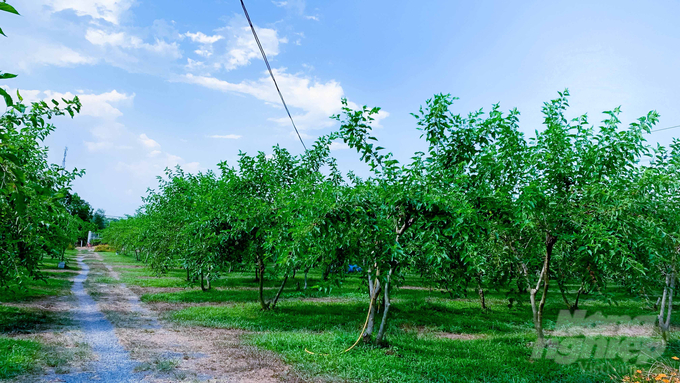
Although he does not use much fertilizer, Mr. Vu's mulberry garden is always green because the grass underneath retains nutrients and helps microorganisms in the soil grow. Photo: Tran Trung.
Since the beginning of 2023, Nguyen Thanh Vu's mulberry orchard in the province of Tay Ninh, which consists of more than 1,000 roots, has produced fruit continuously. The roots of the mulberry are surrounded by grass that is allowed to grow freely. It is anticipated that Vu will plant more grasses and other vegetation.
For several years, weed growth beneath the fruiting plants is normal. However, as a result of the belief that weeds will compete with plants for sunlight and nutrients, almost all gardens eliminate weeds with a number of measures, including the overuse of herbicides, which has a significant impact on the environment and the quality of agricultural products.
In contrast to most plants, weeds require no care to flourish; the more they are eradicated, the stronger they will become.
Under the durian roots at Huynh Quoi durian plantation (Som Suoi hamlet, Hung Thuan commune, Trang Bang district, Tay Ninh province), lush grass flourishes. Even during the arid season, weeds aid Huynh Quoi to conserve water. In addition, weeds are resistant to soil erosion because their roots create conditions for microorganisms to penetrate and operate in the soil. Mr. Quoi has always regarded grass as a close ally when cultivating agricultural land for many years.
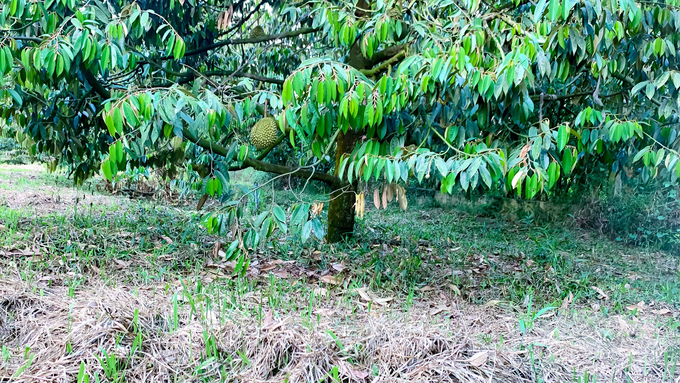
Many organic farming farms today only apply weed cutting to control them instead of eradicating them. Photo: Le Binh.
"When fertilizing, the garden containing wild cabbage will retain moisture, avoid direct sunlight and rainfall, and help the soil become more permeable, thereby minimizing fertilizer loss. At the same time, when weeds are cut, they become vital organic substances that return nutrients to the soil, sustaining the garden's ecosystem and enticing natural adversaries. Therefore, maintaining weeds will reduce the use of pesticides in gardens if we know how to maintain weeds effectively and use weeds to balance the garden's ecosystem".
In fact, our ancestors have regarded grass to be friends for thousands of years. Not only are weeds innocuous to the plant, but they also retain moisture and sustain the microorganisms that make the soil resilient.
According to Dr. Tran Dinh Ly, Vice-Rector of the University of Agriculture and Forestry in Ho Chi Minh City, the purpose of weeding in the past was to create space for vegetation.
The vegetation is still well-kept and constantly regenerates, giving the cattle something to eat, the land is not eroding, and the air is pure. Our ancestors did not view plants as enemies but as allies, as Dr. Tran Dinh Ly explained.
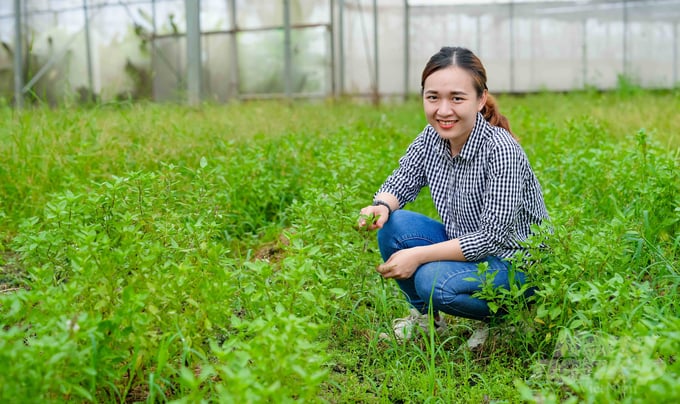
Weeds interwoven in the vegetable beds. This does not make the plant "compete" for nutrients, but on the contrary, helps to focus more nutrients on the tree. Photo: Le Binh.
Japan is a nation that adheres to natural agricultural principles. Moreover, the management of weeds is an integral element of their cultivation practices.
Masanobu Fukuoka (1914–2008) was a Japanese soil expert and the pioneer of "natural farming" or "do-nothing farming." He believed that mankind is progressively growing apart from nature and attempting to eradicate pests by any means. According to him, it is nonsense and will demolish everything. Fukuoka's agriculture consists of no vegetation control, no pest control, no tillage, and no fertilizer.
After many years of working in Japan, Assoc. Prof. Nguyen Thi Bay, Chairman of the Ho Chi Minh City Orientally Traditional Medicine Association, is very impressed with Japanese agricultural practices and agricultural philosophy.
"According to the Japanese, vegetables grown with one's own hands must be utterly extremely clean and be able to be consumed unwashed. As for vegetables grown with weeds, not only are they tasty, but they are also natural remedies for curing diseases".
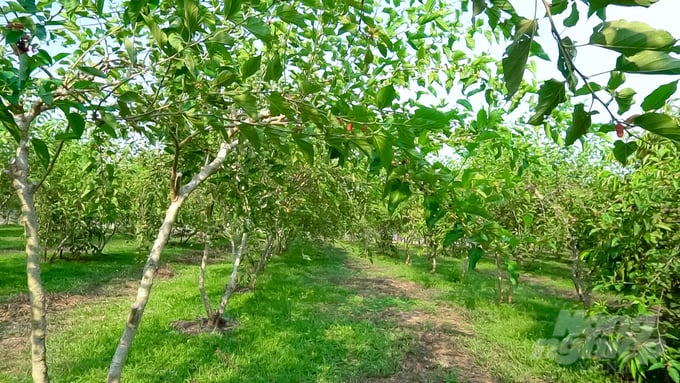
Today's farmers have increasingly realized the great benefits of weeds and see weeds as friends rather than enemies as previously misunderstood. Photo: Le Binh.
And for those of us who work in medicine, particularly oriental medicine, there are always numerous medicinal plants growing in the weeds. Associate Professor Dr. Nguyen Thi Bay remarked that almost all medicinal plants in Vietnam are garden weeds or wild plants.
According to soil science, during the sunny season, vegetation safeguards the soil's microorganisms and maintains the soil's humidity. When fertilizing, the vegetation serves as a "fence" to retain the fertilizer and prevent loss. During the wet season, vegetation aids producers in preventing soil erosion. When weeds are growing, gardeners will cut them, compost them on the remains to make organic fertilizer and create a humus layer for plants.
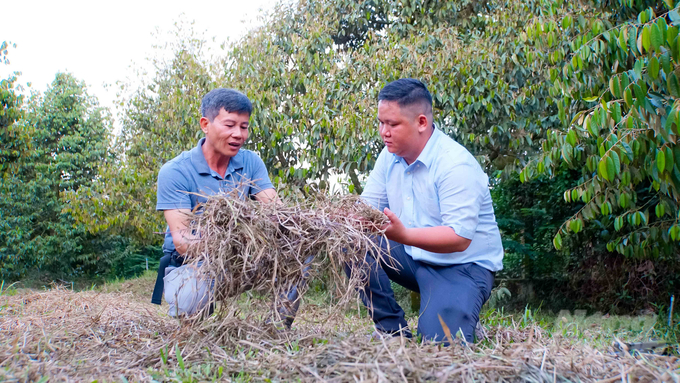
The greensward of Huynh Quoi durian farm has just been cut to prepare for the coming rainy season. Photo: Tran Trung.
Dr. Tran Dinh Ly, vice president of Ho Chi Minh City University of Agriculture and Forestry, stated that producers hesitate to adopt organic agriculture due to productivity concerns. The most effective way to pursue organic agriculture is to enhance, restore, and promote soil nutrients. The primary factor in this solution is weeds.
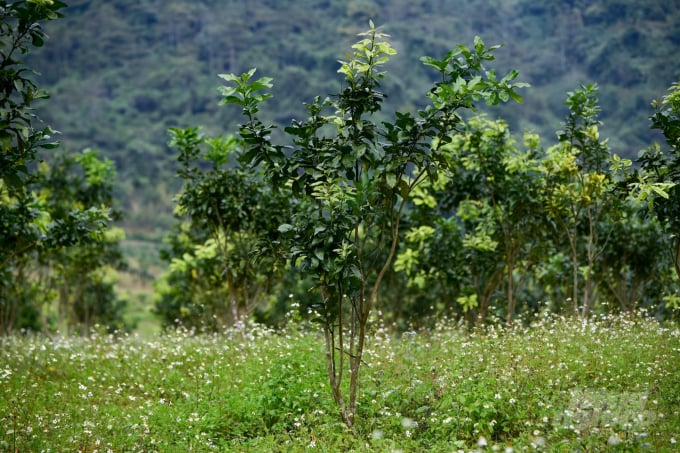
Currently, many organic agricultural production models, in the organic direction, have considered weeds as one of the key factors in production. Photo: Dinh Tung.
"Feeding the land with weed mulch, green manure, etc. helps restore the environment and microbial ecosystem, returns the inherent nutrients to the soil, and gives the soil time to rest so that it can balance, maintain, and regenerate the necessary amount of nutrients in addition to pest control measures to increase yield through each crop," said Dr. Tran Dinh Ly.
Translated by Linh Linh

(VAN) According to the Binh Thuan Department of Industry and Trade, in the first five months of 2025, Binh Thuan's dragon fruit export turnover increased by 20.65% compared to the same period last year.

(VAN) EU countries on Thursday gave final approval to new tariffs on fertilizer imports from Russia, a move aimed at cutting off revenue that could support Moscow’s war in Ukraine, despite concerns from European farmers.

(VAN) The working delegation from the Ministry of Agriculture and Environment conducted an important trip to the Netherlands to strengthen strategic partnerships and sustainable development in the agricultural sector.

(VAN) The letter ‘A Plea from the Ocean’ not only evokes emotion but also awakens the human conscience to the responsibility of protecting life on Earth.

(VAN) The Department of Agriculture in South Africa has announced the country’s first mass vaccination of poultry to prevent local birds from contracting avian influenza.

(VAN) Establishment of the Mekong Delta Regional Agricultural Linkage Center, aiming for a closed value chain, deep processing, trading platforms, and international market connectivity.

(VAN) Gia Lai province has recently recorded 460 rare species of animals and plants, contributing to forest conservation and biodiversity planning in the region.